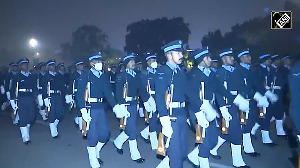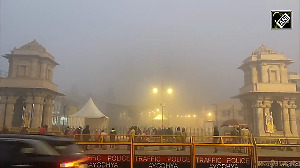Pakistan is a nation of confounding murkiness where every kind of deception, collusion and outright sham are recurring motifs in the political theatre, according a media report published in New York.
Much of the trickery is institutionalised. "The ISI - the shorthand name for the military intelligence agency is widely presumed to be an expert puppet master, the great Oz of a manipulated society," says an article in the New York Times.
Saying the country is characterised by sharp regional, religious and ethnic divisions, the article expresses concern that the government could lose control over its nuclear weapons.
Describing Pakistan's military ruler Gen Pervez Musharraf as 'often a brash former commando', the article says from the beginning, he professed a devotion to democracy. But his deepest beliefs 'seem to be in his own indispensability', and he has connived to hold on to power even after allowing national elections.
The country has been 'reliably unsteady' with democracy yet to strike roots. Musharraf is guided more by self-interest to keep himself in power than his professed love for democracy.
Regarding the success of the Muttahida Majlis-e-Amal (MMA), a coalition of six religious parties, in the last general election, it says conspiracy theorists and others believe that 'wily' Musharraf had backed the religious parties to 'scare gullible Americans into meting out more aid'. They call it a Military-Mullah alliance.
In the past 25 years, it says, American policy towards Pakistan has largely been devised to fit the events happening in Afghanistan. As an example, the article says, the US response was very tepid even after it was disclosed that Islamabad had been swapping vital nuclear secrets with North Korea in exchange for ballistic missiles in the late 1990s. The Bush administration imposed sanctions against just one laboratory because Musharraf had joined its fight against the Al Qaeda.
Emphasising that Musharraf's 'dedication to the Kashmir issue is indisputable', the article says that for more than a decade, the military has trained and financed civilian jihadis who 'cross into Kashmir to create havoc'.
"This guerrilla combat was once entirely an indigenous Kashmir rebellion against New Delhi but the Pakistanis quickly hijacked it. Radical groups supplied much of the manpower, often enlisting students eager to enter paradise through the golden door of a martyr's death," it said.
Referring to the Kargil incident, which was resolved after the then Pakistani prime minister Nawaz Sharif made a 'desperate' trip to Washington seeking President Bill Clinton's intervention, the article quotes then special assistant to the White House Bruce Riedel as saying that there had been 'disturbing evidence that the Pakistanis were preparing their nuclear arsenal for possible deployment'.






 © 2025 Rediff.com -
© 2025 Rediff.com -